- Home
- Frank Herbert
Destination Void Page 11
Destination Void Read online
Page 11
“But isn’t that pretty much the way human memory works?” Prudence asked. “And here’s another thing: It produced the right answer at the translator. The right answer.”
Bickel looked at her, turning that fact over in his mind. She was right, by God! And not for the reason he had so glibly spouted.
The thing had produced the right answers in spite of errors and misprogramming. The processing procedure stank. It was heuristic and should not under any circumstances have yielded the desired output.
But it had. Why?
Bickel experienced a mental sensation as though his mind lurched. It was so much like a physical sensation he wondered that the others didn’t notice.
The beautiful clarity with which he understood what had happened in the computer washed through him like a stimulant.
Didn’t the others see it?
He looked at Prudence, at Timberlake, realized this had all occurred in a fraction of a second.
“For motion produceth nothing but motion.”
The words rang through his mind, producing awe at the way apparently disconnected bits—a line of poetry here, a technical phrase there—could link with a simple turn of mathematics to produce a right answer in his mind.
Just the way it had happened in the computer.
Prudence, correctly interpreting Bickel’s expression, spoke quietly, “You’re onto something, John.”
He nodded. “Prudence, you’re our mathematician. What’s pi?”
She stared at him, puzzled.
“I’m serious,” Bickel said.
“The ratio of the circumference of a circle to its diameter,” she said. “A rational approximation would be approximately twenty-two over seven. A closer approximation would be three hundred and fifty-five over a hundred and thirteen.”
“For most applications, that approximation of pi would give us significant results?” Bickel asked.
“You don’t have to ask that. You know it would.”
“Okay, now tell me why you didn’t answer my question by saying pi is a sweet concoction of starchy crust enclosing a filling often of fruit?”
She saw his seriousness in the way he stared at her, waiting. This bore on the problem in some way. She looked at Timberlake and he interpreted her motion as an appeal for help.
“It’s obvious,” Timberlake said. “You set up a category first by saying, ‘You’re our mathematician.’ Then you asked: ‘What’s pi? You didn’t say: ‘What’s a pie?’”
“Yeah,” Bickel said. “You had two screening references through which to filter the question and come up with the right answer. Then, because you sensed this was a rhetorical question in some way, you didn’t try to explain first that there’s no rational number for pi; you just gave me the rational approximations.”
“Well, I knew I didn’t have to explain that to you,” Prudence said.
“That was category ‘common information,’” Bickel said. “All you had to do was produce the significant answer.”
“Holy cow!” Timberlake exploded, seeing where Bickel was leading them.
“Holy Ox, you mean,” Bickel said.
Prudence whirled, pointed wildly toward the computer panel. “But it wasn’t conscious! It couldn’t have been!”
“It wasn’t conscious,” Bickel agreed. “But first crack out of the box, we’ve produced a significant result. And it was no accident. What can we say about the results of this test? First, we can say that the computer had sufficient information to produce an accurate answer despite errors in the system. Second, we can say that we’ve introduced a new kind of sense data into the system previously called a computer. We can go on calling this a computer, but it’s a step up from ‘computer’ now. It has learned how to use a new kind of sense data.”
Prudence started to speak, stopped.
“Screen everything I’ve said here through field theory,” Bickel said. He grinned at them. “Then remember that we matched three energy sources in the Ox. The integrator there set them up to go out identically. The buffer potential of this storage unit here scattered those pulses through the system. They were divided and re-divided … but wherever they matched they reinforced each other.”
“In itself, the original program pulse was a kind of comparator,” Timberlake said. “The computer could compare for accuracy on the basis of signal strength.”
“And the computer already knew how to compare the AAT signals for accuracy by screening them through a code-matching grid,” Bickel said. “Signal strength was merely another kind of grid.”
“If you’re not too busy congratulating yourself,” Prudence said, “consider how some of those rematched signals must’ve grown in strength. The probability is that some elements of the computer have been shocked out of—”
“We’re still running,” Bickel said, but he spoke defensively, realizing that Prudence was right. There were overload fuses throughout the filter to protect components, but stray signals overriding barrier potentials could have played hob with some of the master programs. He looked at the overhead screen which showed Flattery manning the Com-central board.
Flattery appeared relaxed, but watchful, his gaze traversing the big board.
Damn her! he thought.
One instant everything had been rosy, full of elation that the Ox had come a short step up the ladder—not into consciousness … but toward it. And all she could think to do was throw cold water on them.
Bickel met Flattery’s gaze in the screen. “Have you been listening, Raj?”
“I’ve been listening,” Flattery said.
“Have we gone sour, yet?” Bickel asked.
“You really think I’m this hypothetical human fail-safe device?” Flattery asked, holding his tone to a nice balance between mockery and injured innocence.
He almost goes too far, Prudence thought. If he isn’t underestimating Bickel, he’s pressing the limits. One course is as dangerous as the other.
“You’re the logical candidate,” Bickel said, “but I was asking for your comments on progress.”
Flattery suppressed an abrupt feeling of jealousy. Bickel, in spite of the obvious flaw—and that was a gaping thing—balanced so beautifully. Or … he appeared to balance, which was much the same thing as far as this operation was concerned.
“Ahhh, progress,” Flattery said. “If I understand your original test correctly, the pulse-time distances didn’t check out with the space distances. They weren’t proportional.”
“That’s essentially it.” Bickel wondered why Flattery’s tone made him feel so defensive. “They averaged out to almost a zero product.”
“The artificial nerve nets produce something vaguely equivalent to psychological space.” Flattery paused, scanned the Com-central board, returned his attention to the screen and Bickel. “You can say that the test pulses are more or less like sense data feeding into psychological space—a region somewhat equivalent to what Prudence calls imbedding space. I like her cobweb-and-ink analogy. But there’s a big difference between physical space and psychological space.”
He let it hang there a long time, forcing Bickel to admit a dependency upon someone else’s expertise.
“If you’re going to explain it, then get at it,” Bickel said. There was anger in his voice. He didn’t enjoy depending on Flattery.
“Okay.” Flattery kept his tone even and friendly.
“You can time a signal across physical space, repeat it and get matched results. Any difference will have a positive relationship to a change in distance. But psychological space … now, that’s something else again. The time there could depend on mood. What’s mood, John? Is it a comparison between this and previous experiences of a similar kind? Your pulse-time in psychological space will meet many more variables than it does in physical space.”
“Are you saying we haven’t analyzed our results correctly?” Timberlake asked. He glared up at the screen, feeling that he and Prudence and Bickel were arrayed somehow against Flattery.
“Zero by probability,” Bickel said. “That won’t wash.”
“That shot-effect test,” Flattery said, his voice bored, “fired off impulses which weren’t time-regulated. You got a variety of delay times there and in your system. That could average out statistically—by probability mechanics.”
“Over the entire net?” Bickel demanded.
“Why not? The bigger the net, the more likely this is to be true. And your net here took in the entire computer.”
“But we got the right answer from the translator,” Bickel said, his voice pouncing. “Try probability on that!”
“I wouldn’t think of it,” Flattery said. “No more than I’d think of coming to definite conclusions on the basis of one test run.”
Bickel glared at him. “Okay, we’ll run it again!”
“No, you won’t,” Flattery said. “Not without figuring how to isolate your Ox from the computer … and before you think of taking any storage units out of the system, ask yourself which one it’ll be. Will it be a unit protecting the life of someone in the hyb tanks? How about a unit controlling the drive?”
“We can’t tell one from the other without a complete block-sort of the entire system,” Bickel protested.
“Exactly. That shouldn’t take more than eight or nine years—with the manpower available to us.”
Flattery’s argument was unassailable, Bickel knew. This didn’t ease the anger that surged through him at the sight of the man’s coldly superior attitude. Still, Bickel felt they had approached some unspoken, elusive, and vital fact that all of them should recognize. They had approached it and wandered away.
“Then we’ll transmit the problem back to Moonbase and let them run it for us,” Bickel said.
“Forgetting your analysis of why we were sent out here to solve it,” Flattery said.
“Ahh, you’re admitting we were sent out here to sink or swim.”
“I’m admitting nothing, but I’d suggest you come in and man the AAT. A message has been reeling in from Moonbase for the past minute.”
Chapter 16
The high data-rate sense perception and identification abilities of the human system mostly bypass verbal/analytic awareness. We are generally conscious of a cognitive recognition after the fact. In this way, what we understand as consciousness has to be identified as a reflexive monitoring ability with quite limited application. To produce consciousness (artificial or otherwise) we are stepping down, not up.
—John Lon Bickel (#5), Message Capsule datum
Morgan Hempstead’s burst-depersonalized voice filled the control room as Bickel started the playback of the new message from Moonbase.
“Calling UMB ship Earthling. This is Project calling UMB ship Earthling.”
A long, rolling silence followed and they grew aware of the hissing of the tape as it sped across its sorting heads.
To Prudence, that hiss was something primordial and perilous. It was a noise from the slime of evolution and she felt that some dangerous part of her own brain came awake at hearing it.
That’s foolish, she told herself, I’m reacting to my last injection.
That had to be it: the chemical experiments on her own flesh were creating imbalances. She was using a series of variations on tetrahydrocannabinol now, shifting the CH3 forms and adding oxygen.
That was just the hissing of tapes, she reminded herself. But her head wanted to move from side to side. Something within her was fascinated by that sound.
Bickel glanced around the room—Flattery at the big board yet, composed and so serenely sure of himself; Prudence in her action couch and with her eyes intent on the vocal translator at the AAT; Timberlake in his couch, eyes closed, breathing deeply. One might almost think he was asleep, but for the pulse at his temple. Bickel recognized that mannerism of Timberlake’s. It meant the man was chewing over a heavy problem.
“Hit it,” Hempstead said.
“That must be an error,” Bickel said. “The AAT goofed on that one.”
“We do worse ourselves sometimes,” Flattery said.
“On the question of defining consciousness,” Hempstead said. “Reference is made to nerve barrier and threshold data your computer. Best dive to date.”
“Best definition to date,” Flattery said. “That’s what he must’ve said.”
“New Organic Mental Core,” Hempstead said. “Medical personnel are directed to abandon all such repeats in their waste of order.”
“There’s something wrong with the AAT,” Prudence said.
“Not with the AAT,” Bickel said. “With the translator circuits from the computer.”
“That goddamn wild program we flushed through the system like a high colonic,” Timberlake growled. He opened his eyes and stared accusingly at Bickel.
“Abandon all such attempts,” Hempstead said. “Repeat: abandon all such attempts. This is a direct order.”
“That sounds like him rightly enough,” Prudence said.
“Under no circumstances are you to attempt to make inanimate components,” Hempstead said.
“Try that one on your violin,” Timberlake said.
“Analyze course and reaction data related to mass changes,” Hempstead said. “Unknown area derived mathematically.”
“Hash!” Timberlake snarled. “Garbage!”
“Project over and out,” Hempstead said. “Acknowledge year compliance.”
Timberlake sat up, swung his feet to the deck. “Go ahead, Bick,” he said. “Acknowledge year compliance.”
Flattery glanced at Timberlake, returned his attention to the board. Timberlake obviously was making a bid to regain his authority. That could have been predicted. Their first setback would bring him charging out—from fear for all those lives dependent on the life systems, if not for any other reason. Flattery had watched the way Timberlake studied the life-systems repeaters—nothing wrong there … yet. But a threat to any part of the ship was a threat to all.
“Was he asking us to install a new brain?” Prudence asked.
“Where could we get one?” Timberlake asked.
“We’ve already been through that,” she said, looking at each of them in turn.
And for the first time since taking her position with the umbilicus crew, Prudence allowed herself to wonder what it really would be like to become that fleshless embodiment, the mentality which was central to a driving behemoth such as this ship.
She shivered.
They taunt me with blasphemy, Flattery thought.
“Are you cold, Prudence?” he asked.
He watches me all the time, she thought. The medical part of her faced the feminine part then. “I’m quite comfortable,” she said.
But she wasn’t comfortable. Moods of depression and elation shot through her without warning and had to be concealed. Strange psychic aches tortured her mind—fantasies of godlike power competed with the urge for physical abasement.
She suspected she was close to finding the selective stimulator of consciousness. Some of the combinations she was now using on herself provided enormous amounts of oxygen to the brain in abrupt bursts. There seemed to be a threshold effect involving the blood-brain barrier. The experiments produced residual effects, though. One of their by-products had forced her to complete abandonment of anti-S and its body-chemistry-balance substitutes. Lately, she’d had to mask and suppress acute withdrawal symptoms. And she had found herself unable to deny the profound, compulsive hungers for foods heavy in B-complex vitam
ins.
She also found herself plagued by sexual dream fantasies involving all of her companions.
Bickel turned from the AAT with a length of printer tape, said: “Garbage.”
“What else?” Timberlake snapped.
Flattery started to speak, froze in the act while he studied the track graph on his board. He hadn’t imagined it; the graph was climbing. “We’ve been gaining speed for several minutes. Slow … but steady.”
“Drive problems now!” Timberlake snarled.
Flattery activated the drive readout, scanned it. “No, no emission. G/R level shows the normal radiation drop.”
“Mass register?” Bickel asked.
Flattery’s hands flicked over the keyboard. He scanned his gauges. “Out of register! Mass reference is out of register!”
“What are your readings?” Bickel asked.
“They vary through ten argos”? Flattery muttered. “They don’t graph back … no series-constant in the curve of change. Mass is out of register with speed.”
“What’d Hempstead say?” Bickel demanded, looking back at the printout tape. “‘Analyze course and reaction data related to mass changes.’ If he—”
“That could be garbage!” Timberlake snapped.
“Still that gradual speed increase,” Flattery said. “A slow increment for about four minutes now.”
The ship is programmed for emergencies, Prudence thought. That’s what they said. But which are emergencies from that program … and which are emergencies from an unknown source?
Flattery took a comparator readout. “In the past minute and eight seconds, our speed has gone up .011002 against the fixed reference.”
Bickel began shifting plugs on his computer board. His fingers danced over the keys. He checked the telltales, looked to the visual readout screen.
“Mass interference,” he said.
Timberlake coughed. “Is that thing saying our speed has raised our mass to a point where something is … colliding with us?”

 Direct Descent
Direct Descent The Ascension Factor
The Ascension Factor The Heaven Makers
The Heaven Makers Children of Dune
Children of Dune Old Rambling House
Old Rambling House Dune
Dune The Worlds of Frank Herbert
The Worlds of Frank Herbert The Jesus Incident
The Jesus Incident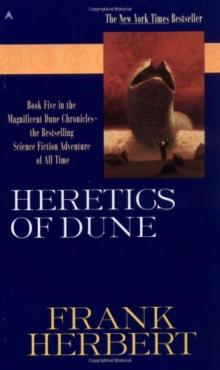 Heretics of Dune
Heretics of Dune Whipping Star
Whipping Star Dune Messiah
Dune Messiah Man of Two Worlds
Man of Two Worlds The Book of Frank Herbert
The Book of Frank Herbert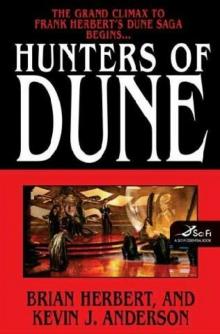 Hunters Of Dune
Hunters Of Dune The Tactful Saboteur
The Tactful Saboteur Soul Catcher
Soul Catcher God Emperor of Dune
God Emperor of Dune The White Plague
The White Plague The Green Brain
The Green Brain The Godmakers
The Godmakers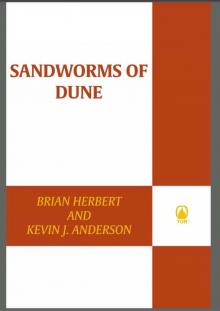 Sandworms of Dune
Sandworms of Dune Destination Void
Destination Void The Dosadi Experiment
The Dosadi Experiment Eye
Eye High-Opp
High-Opp The Eyes of Heisenberg
The Eyes of Heisenberg Missing Link
Missing Link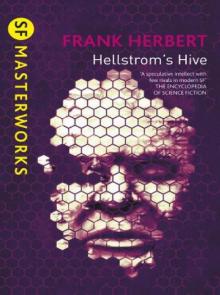 Hellstrom's Hive
Hellstrom's Hive Chapterhouse: Dune
Chapterhouse: Dune The Santaroga Barrier
The Santaroga Barrier The Dragon in the Sea
The Dragon in the Sea Operation Haystack
Operation Haystack A Thorn in the Bush
A Thorn in the Bush Four Unpublished Novels
Four Unpublished Novels Dune dc-1
Dune dc-1 Jorj X. McKie 1 - Whipping Star
Jorj X. McKie 1 - Whipping Star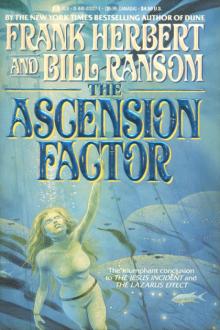 DV 4 - The Ascension Factor
DV 4 - The Ascension Factor Frank Herbert - Dune Book 4 - God Emperor Of Dune
Frank Herbert - Dune Book 4 - God Emperor Of Dune ChapterHouse: Dune dc-6
ChapterHouse: Dune dc-6 The Ascension Factor w-4
The Ascension Factor w-4 A Game of Authors
A Game of Authors Children of Dune dc-3
Children of Dune dc-3 Destination: Void: Prequel to the Pandora Sequence
Destination: Void: Prequel to the Pandora Sequence The Collected Stories of Frank Herbert
The Collected Stories of Frank Herbert Dune Messiah dc-2
Dune Messiah dc-2 Frank Herbert - Dune Book 5 - Heretics of Dune
Frank Herbert - Dune Book 5 - Heretics of Dune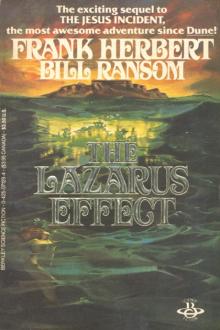 DV 3 - The Lazarus Effect
DV 3 - The Lazarus Effect The Jesus Incident w-2
The Jesus Incident w-2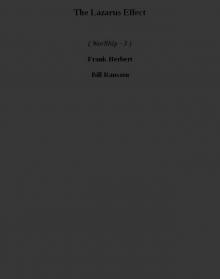 The Lazarus Effect w-3
The Lazarus Effect w-3 Frank Herbert
Frank Herbert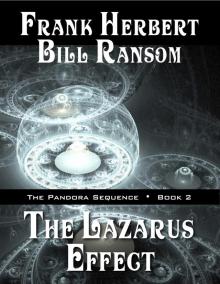 The Ascension Factor: Pandora Sequence
The Ascension Factor: Pandora Sequence Dune (40th Anniversary Edition)
Dune (40th Anniversary Edition)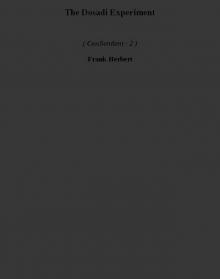 The Dosadi Experiment c-2
The Dosadi Experiment c-2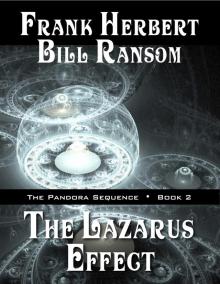 The Lazarus Effect
The Lazarus Effect God Emperor of Dune dc-4
God Emperor of Dune dc-4 The Pandora Sequence: The Jesus Incident, the Lazarus Effect, the Ascension Factor
The Pandora Sequence: The Jesus Incident, the Lazarus Effect, the Ascension Factor The Green Brain (v4.0)
The Green Brain (v4.0) The Heaven Makers (v4.0)
The Heaven Makers (v4.0) Heretics of Dune dc-5
Heretics of Dune dc-5